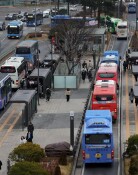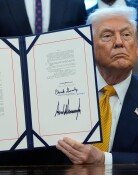[Editorial] KORAILs President
Instead of responding firmly to the railway unions illegal strike, Lee Chul, the president of the Korean Railroad Corporation, seems to be attempting to hold onto his popularity. It is not an overstatement to say that the strike itself was incited by Lee. He lobbied Cheong Wa Dae and politicians for the government to pay the 4.5 trillion won debt caused by building KTX, Korea high-speed rail line, hence creating the union members moral hazard.
On the illegal strike, Lee stated, It is regretful that it is impossible to offer a solution on the individual corporation level. It is also regretful about the reality that it will be settled by laws and principles.
What is he so regretful about? Rather than endeavoring to find its own ways to turn KTX profitable, the railway union is making demands, citing the public service nature of the railway, that will only worsen the losses of the railway corporation. Lee should have been steadfast and firmly denied that the demands from the union to shift the losses to the Korean public to bear the buren were not subject to negotiations.
He said, We are endeavoring to the point of cutting our bones in order to normalize business management, but he doesnt really need to cut his bones. Just try to stop the illegal strike. Or does bone cutting endeavoring mean writing off debts and cutting working hours? Railway Union Chairman Kim Young-hoon incited the illegal strike by announcing the general strike declaration, Stop the world by stopping the trains. Stop the running blood of the economy.
In contrast, Seoul Metro, the former Seoul Metropolitan Subway Corporation, which manages Seoul subways lines 1-4, is appealing to the union, The union should now change. It should stop the vicious cycle of illegal strikes holding public transportation hostage. The corporation and the union reached an agreement and are now operating normally. In order to diminish the inconvenience of commuters, it has increased the number of subways in lines 1, 3 and 4, which Seoul Metro operates jointly with Korean Railway. President Kang Kyung-ho of Seoul Metro used to be a CEO of a private corporation.
Is sending politicians who were defeated in elections to lead a gigantic public corporation that needs restructuring and increasing the losses and public burden the reform of public corporations? The actual start for such reforms would be to sack an incompetent and populist president, who was appointed from above.
Public strength is needed to overcome the railway strike waged by severely morally hazardous organizations.







